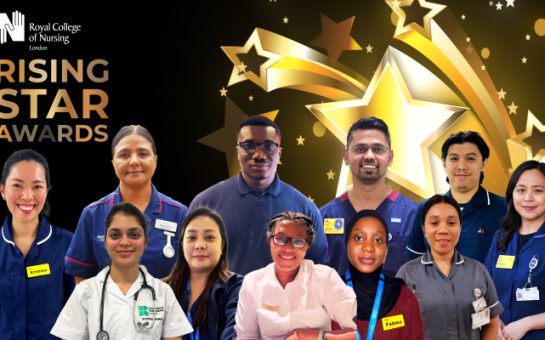Reproductive health conditions like endometriosis continue to disrupt the work and quality of life of for women in London, despite calls for more funding and research.
Many women face huge difficulties in managing chronic reproductive health conditions alongside work, with Bupa research showing that 16.7 million sick days are taken annually due to symptoms linked to periods.
Endometriosis affects one in 10 women in the UK and is caused by cells similar to those in the lining of the uterus growing in other parts of the body. The average diagnosis time is eight years and ten months from the first GP visit.
Jodie Thomas, 26, has experienced 10 years of almost permanent pain and finally has a referral to an endometriosis specialist in southwest London after trying four times to raise the issue with different GPs.
She said: “I was dealing with pain for so long thinking it was other things.
“Sometimes I can’t get out of bed.”
India, 24, had surgery privately in London to remove endometriosis, which was initially meant to be a 30 minute procedure to remove a large cyst.
She said: “It ended up taking an hour and a half to remove the endometriosis and I had a cyst the size of a tennis ball wrapped around my fallopian tube.”
One 24-year-old, who wished to remain anonymous, said: “It affects my ability to sleep, my eating habits, my mood and a combination of these increases anxiety.
“It should be spoken about more. I didn’t realise it was an issue until I started working in an office nine to five and noticed the effect it had on my life.”
Wellbeing of Women funded researcher Dr. Lucy Whitaker from the University of Edinburgh is breaking down the myths around endometriosis.
— Wellbeing of Women (@WellbeingofWmen) January 28, 2025
For more information and tips on managing symptoms, click here: https://t.co/Cpb8PpR5gc#EndometriosisAwareness #WellbeingOfWomen pic.twitter.com/tgESf8Zvgm
CEO of London-based women’s charity Wellbeing of Women, Janet Lindsay, urged employers to have a direct line of communication with employees managing endometriosis.
She said: “Employers can play a crucial role in supporting staff with endometriosis by fostering an inclusive and understanding workplace environment through the promotion of open discussions about women’s health and listening to what their workforce needs.”
A new report published by the charity found that over half of women surveyed said they would feel uncomfortable discussing their periods with their boss or manager and a similar number said they worry that if they took time off for period symptoms it would negatively impact their career.
A parliamentary debate last month led by Gill Furniss MP discussed the need for increased awareness from employers, calling for the implementation of more supportive and flexible working arrangements for those dealing with endometriosis and other reproductive health conditions.
Furniss said: “Many women feel unable to speak openly about endometriosis as they would other conditions, as if it were something to be ashamed of.”
She added that endometriosis should not mean women have to put their careers on hold and leave jobs they worked hard to get.
Minister recognises that “women with endometriosis have been failed for far too long” in Parliamentary debate yesterday (Wednesday 15th January 2025)
— Endometriosis UK (@EndometriosisUK) January 16, 2025
Thank you to @GillFurnissMP for leading this and to all MPs who spoke up for those with endometriosis.
We must now see action. pic.twitter.com/AcYsuYciBP
Catherine Atkinson MP said: “Until this gets real priority and understanding, we will continue to lose out on the talents of women with endometriosis.”
A report published by the Women and Equalities Committee (WEC) in December 2024 found that pervasive stigma associated with reproductive health, a lack of education and “medical misogyny” has contributed to poor awareness of conditions like endometriosis.
The WEC report also urged The Department for Health and Social Care (DHSC) to improve accessibility and education into women’s health conditions, with a focus on increased funding for training and time for medical professionals to undertake it.
An inquiry by the All Party Parliamentary Group (APPG) in 2020 sought commitment from all UK governments to reduce average endometriosis diagnosis time to four years by 2025.
However, data provided by the Royal College of Obstetricians and Gynaecologists (RCOG) shows that gynaecology waiting lists have more than doubled since before the pandemic, with more than three quarters of a million women on waiting lists in the UK.
RCOG’s statistics for NHS South West London’s Integrated Care Board (ICB) show that as of November 2024 there are 15,941 people on gynaecology waiting lists.
The number of people waiting more than 18 weeks for an appointment in the NHS South West London ICB has increased by 1.65% from the previous period to 6,206.
New data provided by the Office for National Statistics (ONS) also suggests that women with endometriosis may be taking lower-paying jobs or working fewer hours.
Among the women accounted for in the dataset, pay decreased on average each year, reaching a £130 monthly reduction in the four to five years post diagnosis compared to the two years before diagnosis.
This data shows that women’s work and personal lives are significantly affected by the barriers to access NHS healthcare, especially for chronic conditions like endometriosis.
Despite a gradual increase in awareness and political discussion of reproductive health issues, research conducted by charity Endometriosis UK shows that 54% of people still don’t know what endometriosis is.
Endometriosis UK CEO Emma Cox said: “The relative lack of both data and research into endometriosis has historically made it easy to overlook or fail to grasp the seriousness of the disease.”
She added: “Without strong evidence, decision-makers in healthcare and other sectors have either not recognised the scale of the issue, or not been able to argue for investments to support those with endometriosis.”
There is however some hope for improvement to the work and quality of life of those with endometriosis.
A new UK-wide five year research project has launched, seeking to make fundamental strides in endometriosis-related care.
The Endo1000 Project led by Professor Andrew Horne at The University of Edinburgh will gather data from apps, smartwatches, healthcare records and biospecimens from 1000 women with endometriosis.
The project is still in its early stages and not yet recruiting participants, however it hopes to allow much needed research into the development of individualised care for those with endometriosis through a more holistic approach.
The majority of research requires government-backed funding to happen which is why endometriosis has been overlooked for so long.
Professor Geeta Nargund, founder of Create Health Foundation and senior NHS consultant said: “It is essential that the government prioritises funding for the 51% of our population and tackles the critical disparities in access to care across the UK to improve health outcomes for all women.
“This is a crucial step not only in closing the gender health gap but also in achieving economic prosperity for our nation.”
Featured image credit: unknownuserpanama via Pixabay.





